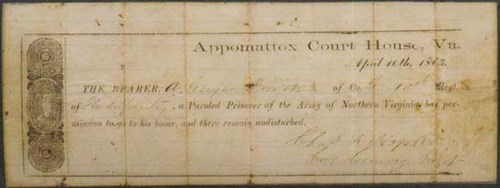The War Ends: Surrender, Occupation, and Emancipation

During the spring of 1865, the infrastructure of the Confederacy collapsed. The northern advantages of superior numbers of troops, combined with a huge industrial base, had exhausted the South in a four-year war of attrition. General Lee's once-mighty Army of Northern Virginia was starving and, after the abandonment of Petersburg and Richmond, outmaneuvered by a relentlessly pursuing Union Army of the Potomac. Lee surrendered to General Grant at Appomattox Court House, Virginia, on April 9, 1865. Unable to link up with General Lee, the South's other major field army, the Army of Tennessee, under the command of General Joseph E. Johnston, surrendered on April 26th at Durham Station, North Carolina. As part of the surrender of the Army of Tennessee, other areas in the Southeast, including Florida, were instructed to yield to federal troops.
News of the war's end reached Florida in rumors and fragments later in April and in early May. Several months before, Florida's Governor Milton had proclaimed that death would be preferable to reunion, and on April 1, he ended his life with a self-inflicted gunshot wound. The state's adjutant general removed the retired battle flags from the capitol and turned them over to his sister to hide them to prevent them from falling into Union hands.
The people of Florida greeted the end of the war in very different ways. For Lieutenant Francis Fleming, a Florida Confederate officer whose brother had been killed in battle the year before, the end was "a sad and terrible result." In contrast, for some other Florida troops, weary and anxious finally to go home, the news of the war's end was greeted with cheers. In Union-occupied areas of the state, cannons boomed victory salutes.
On May 10, 1865, Union Brigadier General Edward McCook and his staff entered Tallahassee without incident. McCook and his occupation force had come from Macon, Georgia, to establish federal control and authority in Florida. Confederate troops signed parole documents agreeing not to fight and turned over military equipment to federal authorities. In a May 20th ceremony marking the formal transition of power, Union troops raised a large United States flag over the state capitol. On the same day, General McCook announced the Emancipation Proclamation, formally freeing enslaved blacks in Florida. The war was over for Florida, and the uncertain period of Reconstruction began.



